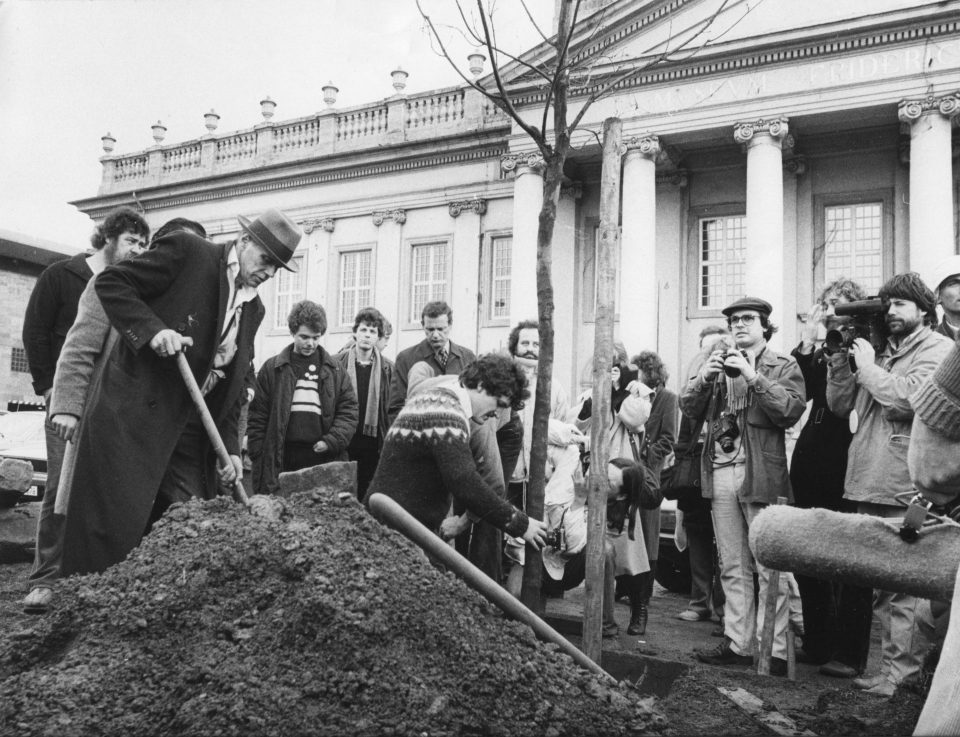
Marilyn Monroe: Trees give me a little hope
19th March 2016
Thoreau and Arboriculture
12th July 2016George Orwell: Spring is here, and they can’t stop you enjoying it.

George Orwell is one of England’s greatest writers. He is not famous for nature writing, yet Orwell’s 1946 essay about the arrival of Spring, is a masterpiece. It’s a clearly written easy-read, avoiding any of the flowery language often used in nature writing, and it highlights Orwell’s brilliant insight, humanity and common sense truths that are still helpful today.
He begins his essay by referring to the toad – largely because he sees it as the underdog of the harbingers of Spring, “because the toad, unlike the skylark and the primrose, has never had much of a boost from poets”. He amusingly details the “intense sexiness” of the toads mating habits, and notes how “a toad has about the most beautiful eye of any living creature”.
Orwell then goes on to celebrate Springtime in general, highlighting its universal impact on desolate post war London streets: “The point is that the pleasures of spring are available to everybody, and cost nothing. Even in the most sordid street the coming of spring will register itself by some sign or other, if it is only a brighter blue between the chimney pots or the vivid green of an elder sprouting on a blitzed site. Indeed it is remarkable how Nature goes on existing unofficially, as it were, in the very heart of London… Suddenly, towards the end of March, the miracle happens and the decaying slum in which I live is transfigured.”
And of course, being Orwell, he considers the politics of enjoying nature, asking: “Is it wicked to take a pleasure in Spring and other seasonal changes? To put it more precisely, is it politically reprehensible, while we are all groaning, or at any rate ought to be groaning, under the shackles of the capitalist system, to point out that life is frequently more worth living because of a blackbird’s song, a yellow elm tree in October, or some other natural phenomenon which does not cost money and does not have what the editors of left-wing newspapers call a class angle?”
By asking this question, Orwell is referring to the once common belief among the “Left” that a fondness for nature was the privilege of affluent sentimental town-folk – the bourgeoisie. The focus of the Left has traditionally been on progressing economic and institutional change and ‘Nature’ was thought to have little to do with these issues. While this hostile attitude has thankfully diminished since 1946, it does not seem to have disappeared completely. Recently in Sheffield, South Yorkshire, a private finance initiative contract to manage its roads included a tree survey which led to the felling of thousands of Sheffield’s street trees, because their roots were getting in the way of the resurfacing methods. A grass-roots protest by residents against the unwarranted removal of the healthy street trees was clumsily attacked by members of the Labour Council and Left-wing academics, who attempted to define the issue in terms of class, and by portraying Sheffield residents love of their trees as a selfish indulgence of the affluent.
It seems Orwell, a socialist, would have sided with the tree-protesters. He brilliantly rejects the notion of nature as being merely sentimental as “demonstrably false”, noting how all cultures and classes have valued nature throughout history and how “if we kill all pleasure in the actual process of life, what sort of future are we preparing for ourselves? If a man cannot enjoy the return of Spring, why should he be happy in a labour-saving Utopia?” Ultimately, he suggests that if a modern, technically and socially advanced utopia was ever achieved, then simple pleasures of observing the natural world would become ever more vital: “I think that by retaining one’s childhood love of such things as trees… one makes a peaceful and decent future a little more probable”.
He finishes the essay by showing how the ability to appreciate Spring and Nature is a basic human right, that cannot be taken from us:
“Spring is here, even in London, and they can’t stop you enjoying it. This is a satisfying reflection. How many a time have I stood watching the toads mating, or a pair of hares having a boxing match in the young corn, and thought of all the important persons who would stop me enjoying this if they could. But luckily they can’t. So long as you are not actually ill, hungry, frightened or immured in a prison or a holiday camp, Spring is still Spring. The atom bombs are piling up in the factories, the police are prowling through the cities, the lies are streaming from the loudspeakers, but the earth is still going round the sun, and neither the dictators nor the bureaucrats, deeply as they disapprove of the process, are able to prevent it.”





